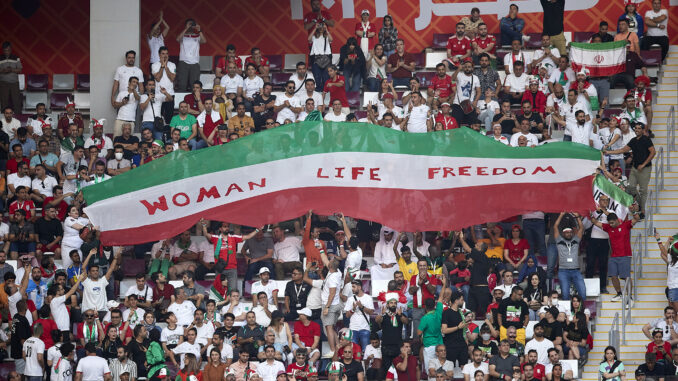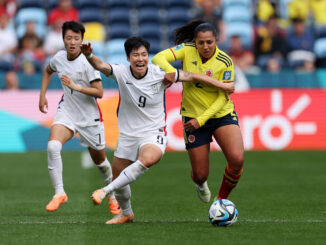

The Asian Game’s coverage of the FIFA World Cup Qatar 2022 is proudly sponsored by SMC.
Mehdi Taremi might not have celebrated after scoring either of Iran’s goals in their 6-2 thumping by England at the Khalifa International Stadium but, in a game where every reaction was scrutinised for symbolism, the Porto striker’s sombre response to both of his goals was notable for his demeanour.
There was no punching of the air, no joy. Not even the flicker of a smile. Such is the mood around the Team Melli squad that anything more than picking the ball up and receiving the recognition of his team mates would have been surprising.
This was an Iran team that carried the weight of events at home on their shoulders. There was a defiance in their pointed silence during the playing of the Islamic Republic’s national anthem, a period that was greeted with mass booing by the Iranian fans in the crowd.
The supporters who follow Iran at the World Cup are often very different to those who fill the Azadi Stadium to capacity when opponents are entertained in Tehran. The majority attending in Qatar are expatriate Iranians, flying in from the United States, Europe and around the region.
This is a constituency that has no love for the regime in Tehran. Many are the offspring of those who left in the wake of the revolution in 1979, when Ayatollah Ruhollah Khomeini came to power and the country’s brightest and best sought to escape the theocracy.
It is these fans who carry the pre-Islamic Revolution flags over their shoulders, and it is these fans who show no love for the trappings of the state.
But during Iran’s previous World Cup appearances – most recently in Brazil and Russia but also in France in 1998 and Germany eight years later – the playing of the national anthem has been respected. Not this time, however. Not when the country is once again in turmoil.
Football – and specifically, but not exclusively, the national team – has often been a focal point at times of protest in Iran. The last notable instance came in 2009 during the Green Revolution, when huge numbers turned out to rail against the reelection of Mahmoud Ahmedinejad.
In Iran’s final qualifier in Seoul – a game Afshin Ghotbi’s team needed to win to qualify for the World Cup – players wore green tape around their wrists in a symbol of solidarity with those questioning what they believed was a stolen election by the religious hardliner.
Tales soon emerged that night of pressure being exerted on the team from political minders travelling with the squad and moves to quell potential escalations in the protests should Iran gain the win required and qualify for the World Cup. There was relief in the corridors of power when Ghotbi’s side fell short due to Park Ji-sung’s late equaliser.
Football has a unique power in Iran, and it is showing that again. While their team were being overrun by a rampant England, the fans chanted for their heroes. But it was not Taremi or Alireza Jahanbakhsh who were being lauded. Instead it was the names of Ali Karimi, Karim Bagheri and Ali Daei who were echoing through the Doha evening air.
That trio – legends from Team Melli’s golden era in the 1990s and early 2000s – have used their high-profile status within the nation to back the protests against the treatment of women and the heavy-handed approach of the regime in recent months.
Groups of fans walked around the Khalifa International Stadium adorned in green shirts bearing the slogan “Woman, Life, Freedom” on their chests while the name of Karimi, the former Iran and Bayern Munich playmaker, was emblazoned on the back.
“Everyone in Iran is happy that they lost,” fashion blogger Farya Ahmadi, herself attacked by authorities just hours before leaving Isfahan to attend the game against England, told The Asian Game.
“The government don’t respect the people. The people are really angry and they don’t want the team to achieve anything for the Islamic Republic. All the people in the stadium are happy that they lost because they’re not with the team.
“This World Cup for other people in the world is a festival. But for us it’s not a festival. For us we want to speak with other people and let them to know about our situation. We want women’s freedom.”
With the country in turmoil once more, football is yet again the platform being used by the disaffected and the downtrodden desperately hoping to finally see lasting and significant change. The World Cup will continue to be the protesters’ stage for as long as Iran remain involved.
Photo: Getty Images




